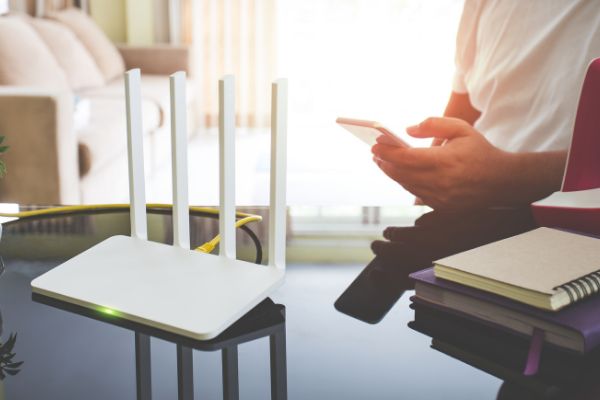Even before health concerns made remote work a provisional reality for millions of people in 2020, a growing number of people were waving goodbye to their arduous commute.
A Gallup’s ‘State of the American Workplace’ study revealed that “the percentage of Americans who worked remotely (whether part- or full-time) in 2016 increased from 39% to 43%.”
Being in the office full-time is no longer necessary for you to be a productive part of the team, as technologies such as Zoom, Facetime, Skype, and more evolve. Of course, we can’t forget the old methods of sending texts and emails or the latest fad, cloud computing. However, it’s vital to efficiently handle your work from home. Let’s take a look at how this can be done.
First things first, working efficiently from home involves having an established work area with the appropriate equipment, strategies for dealing with children, pets, and other possible distractions, and a timetable that enables social interaction and inspiration attained by working with people.
Here are some methods and pointers for being a prosperous remote employee or boss.

Understand the Ground Rules
Is your boss a stickler for a 9-5 roster, or do you have some wiggle room? Is it permissible for you to utilize the public internet? Which tech tools will be most suitable for your communications needs?
If you’re an employee, ensure your employer outlines the dos and don’ts and equips you with the vital tools and instructions that you need to operate efficiently.
Make sure to test the equipment and system to iron out possible issues that may arise. Having several of the same tools might be required if you’re self-employed.
Create a Work Environment that Is Both Functional and Appealing
Although not all remote workers have a dedicated home office, having a private, peaceful location to work in is essential. If at all possible, keep your workspace and personal areas apart. This will help you to be dedicated to work during the workday, and also feel like you can walk away from it and relax when it’s time to “go home for the day.”

Obtain the Internet Speed that You Require
If you have children, their video calls and game box usage may cause your connection and internet rates to drop. Going closer to the Wi-Fi router will help since remote devices usually consume bandwidth. If you can’t physically get closer due to where you’ve set up your workspace, swapping for Ethernet will help. Because most laptops aren’t equipped with Ethernet ports, you may require a dongle as well as the Ethernet cord to attach the router and computer.
Use the Apps on Your Phone
If your job requires you to make international or long-distance calls, utilize apps like Skype and WhatsApp as they are all free to use if the individual you’re phoning are both using the same service.

Distractions Should be Kept to a Minimum
Noise-canceling headsets are ideal if you have a lot going on in your home or neighborhood. If the children are home and you don’t have access to daycare (for example, over the school break or in the event of a natural disaster), see if you and your family members (or a neighbor in a related circumstance) can take turns caring for them. It may require talking to your boss about working late hours.
WORK-AT-HOME RECOMMENDATIONS
Although the notion of being the boss, choosing your hours, and working from home has its benefits, there are also a few shortcomings for both self-employed and telecommuting employees. It creates an additional degree of agony and anxiety when it occurs in the midst of a national emergency. Here are three suggestions for achieving harmony.

Maintain a Work Schedule
People who have worked from home will have to cope with a lack of understanding from those who believe that working from home doesn’t work. It is your responsibility to set your working hours, stick to them, work during those hours, and refuse to allow anyone to convince you that you are less of an employee.
Unfortunately, home life comes with its own set of distractions that can waste time and cause well-intentioned house employees to fall behind on critical duties. Personal boundaries will continue to be challenged, in addition to the usual disruptions in the 9-to-5 (vendor calls, power outages, accidents, pet or child demands).
Close family members must understand that you cannot assist them in moving during the workday or even talk for an hour on the phone. It’s tough to set limits when you have youngsters at home. On the other side, allowing children to see you work hard at something you enjoy—even when you don’t enjoy it—can have a significant impact on their future career choices and overall attitude toward work.
Workaholic Tendencies Should be Avoided
Other than reduced hours, efficiency and flexibility are among the main reasons individuals desire to work from home. However, oftentimes too much freedom is a bad idea. It’s difficult to complete your task and pretend you’ve left the office (since you’re technically in the office at all times) especially when you know there’s a deadline looming. Many home-based professionals end up working extra hours rather than less, clocking work time on nights and weekends simply because they can’t ignore it. Some work-at-home professionals do keep a five-hour day rather than an eight-hour day. However, this does not imply that they labor less. Hours are frequently assessed as “billable hours,” which means that for every hour spent executing a service for which they charge, several minutes are spent completing unpaid administrative activities.
Extra Social Encounters Should be Planned
Finally, some people enjoy the idea of working alone. Still, even the most introverted of us can become claustrophobic after a few weeks at home, alone, staring at the same thing for lengthy periods. It can be isolating. Prepare for this by scheduling some time to connect with the outside world, such as a lunch date (even if it’s a late lunch), video chat with a friend, or an exercise program where you’ll meet up with others.






